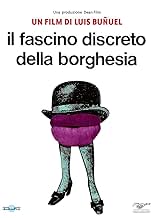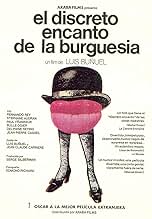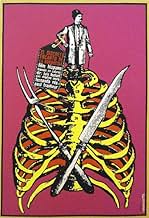Le charme discret de la bourgeoisie
- 1972
- Tous publics
- 1h 42min
NOTE IMDb
7,7/10
49 k
MA NOTE
Une série de rêves surréalistes, concentrés sur six personnes de la petite bourgeoisie et leurs tentatives constamment interrompues de prendre un repas ensemble.Une série de rêves surréalistes, concentrés sur six personnes de la petite bourgeoisie et leurs tentatives constamment interrompues de prendre un repas ensemble.Une série de rêves surréalistes, concentrés sur six personnes de la petite bourgeoisie et leurs tentatives constamment interrompues de prendre un repas ensemble.
- Réalisation
- Scénario
- Casting principal
- Récompensé par 1 Oscar
- 7 victoires et 9 nominations au total
Stéphane Audran
- Alice Sénéchal
- (as Stephane Audran)
Avis à la une
A satire on everyone who's too big for their boots (or secretly wants 2 B), because they will not achieve the aims they pursuit and are ultimately doomed to be separated from their privileges when they wake up to reality. The story may also come across as remote parody on The Last Supper, but from the bourgeois point of view (who never really get their supper), in contrast with 'Viridiana' (1961, Buñuel), where the poor and disabled DO get their Last Supper. But I don't know much about the bible, so I'm probably wrong about that. It proves though that you don't have to be pious to appreciate Buñuel's films; in fact, you'd better NOT be.
The 'adventure' of the protagonists is a proverbial sinking ship, because they seem to know what they want, but never reach their goal, which is quite simple and basic (to eat), because they're so caught up in supposed etiquette. They have all kinds of knowledge about manners and gestures, but they cannot sit down and eat. That is actually a fairly clear message: 'look before you leap' or 'behold the priorities of life'.
What's more indiscrete: drinking a martini the wrong way, or selling cocaine abusing your position as an ambassador and fooling around in the garden while you're having friends over for diner? And are you ultimately discrete simply because nobody discovers your subversive or criminal actions? These guys just can't control their carnal and financial lust, while complaining: 'No system can give the masses the proper social graces. But you know me, I'm not a reactionary.' Blah.
Cinematographer Edmond Richard (Le Procès (1963, Welles), Fantôme de la liberté, Cet obscur objet du désir) exhibits his excellent collaboration with Buñuel's visions. Buñuel tried before to make it easier for audiences to understand the imagery by incorporating it in a dream sequence (e.g. Tristana, 1970), but he returns here (as in Belle de Jour, 1967) to the early days (1930) where the dream sequences were just put forward as if they were reality. You'll never know what is a dream and what is real. As always, there is no music here to guide you, apart from the ringing church bells. Just open up your ears and clean out your eyes and you'll not be disappointed.
One last remark: the cover of the video is definitely one of the most applicable and distinctive covers (Ferracci) ever made, as is the cover of 'Fantôme de la liberté' (an odd-faced statue of liberty with a limp torch) by Jean-Paul Commandeur and the cover of 'Cet obscur objet du désir'. Buñuel didn't worry about the surrealism in his own life. He seemed to live in harmony with all his contradictions and hypocrisy.
10 points out of 10 :-)
The 'adventure' of the protagonists is a proverbial sinking ship, because they seem to know what they want, but never reach their goal, which is quite simple and basic (to eat), because they're so caught up in supposed etiquette. They have all kinds of knowledge about manners and gestures, but they cannot sit down and eat. That is actually a fairly clear message: 'look before you leap' or 'behold the priorities of life'.
What's more indiscrete: drinking a martini the wrong way, or selling cocaine abusing your position as an ambassador and fooling around in the garden while you're having friends over for diner? And are you ultimately discrete simply because nobody discovers your subversive or criminal actions? These guys just can't control their carnal and financial lust, while complaining: 'No system can give the masses the proper social graces. But you know me, I'm not a reactionary.' Blah.
Cinematographer Edmond Richard (Le Procès (1963, Welles), Fantôme de la liberté, Cet obscur objet du désir) exhibits his excellent collaboration with Buñuel's visions. Buñuel tried before to make it easier for audiences to understand the imagery by incorporating it in a dream sequence (e.g. Tristana, 1970), but he returns here (as in Belle de Jour, 1967) to the early days (1930) where the dream sequences were just put forward as if they were reality. You'll never know what is a dream and what is real. As always, there is no music here to guide you, apart from the ringing church bells. Just open up your ears and clean out your eyes and you'll not be disappointed.
One last remark: the cover of the video is definitely one of the most applicable and distinctive covers (Ferracci) ever made, as is the cover of 'Fantôme de la liberté' (an odd-faced statue of liberty with a limp torch) by Jean-Paul Commandeur and the cover of 'Cet obscur objet du désir'. Buñuel didn't worry about the surrealism in his own life. He seemed to live in harmony with all his contradictions and hypocrisy.
10 points out of 10 :-)
"The Discreet Charm of the Bourgeoisie", a leisurely paced, incisive satire on social mores and class hypocrisy, opens with a group of friends arriving on the wrong day of a dinner engagement. this is only the begining of a succession of unexpected and unusual events to follow. The dinner party is the movie's main setting and it is there that reality and illusion often times blend imperceptibly together. The film is structured as a series of surreal sequences, which prompted esteemed film critic Pauline Kael to opine 'His(Director Louis Bunuel) indifference to dramatic logic is complete.' And how. Bunuel's narrative plays an elaborate game with the viewer through it's subconscious imagery and audacious use of time. His tendency to experiment with technique and form often times led to discovery and innovation. The cinema of Louis Bunuel invariably deals with the discrepancy between appearance and reality; decorum and desire. His world view was subversive and anarchistic. He was a cheerful pessimist, skeptical but not susceptible to Bergmanian despair. His skepticism extended to all of those he found playing too neat a social game. The filmmaker's career was one sustained assault on authoritarianism. Witness an indiscreet character in the film who claims: 'No one system can help the masses acquire refinement.' He believed man was, unconsciously, a slave to custom and aimed to shock viewers out of their unthinking acceptance of established values. "The Discreet Charm of the Bourgeoisie"(An Academy Award winner in 1972 for Best Foreign Film) is a boldly inventive picture. Dozens of frames are filled with clever filmic devices: environmental noises increase inordinately during routine conversations; an ambiguous procession is inserted freely within the text. These cinematic ploys add intrigue to the already peculiar goings-on. The walk by the main group of characters along a country roadside is mysterious and compelling. The players are noticeably silent and contemplative. Is this an anxious dream? The afterlife? An insignificant flashback? Whichever, the recurring sequence underscores the obliqueness and cool obscurity of the film. One might not identify closely with the disenchanted Bunuelian sensibility or the unsentimental stance he takes, however one knows immediately and unmistakably that they are in the gifted hands of a film technician like a Godard or Kurosawa. A director in complete control of his medium. A highly personal filmmaker frequently referred as 'a poet of hallucination who follows the caprices of his fantastical imagination.' Someone whose fanciful paths of creation were invariably led by the irrational. "The Discreet Charm of the Bourgeoisie", with it's arresting mixture of calculation and carelessness, remains a unique and influential movie. The acerbic films of Robert Altman and the perverse mischievousness of the Coen brothers films, to mention but a few, pay a large debt to the strange universe and unconventional perspective of Louis Bunuel. Film lovers uninitiated in surrealist cinema will find "The Discreet Charm of the Bourgeoisie" an alluring and beguiling crash course.
In Paris, the ambassador Don Rafael Acosta (Fernando Rey) of the South American country Miranda, who is also an smuggler of cocaine, comes to a dinner part in the house of Henri (Jean-Pierre Cassel) and Alice Sénéchal (Stephane Audran) with their common friends M. Thevenot (Paul Frankeur), his wife Simone Thévenot (Delphine Seyrig) and her sister Florence (Bulle Ogier) but on the day before the scheduled. Henri is not at home and they invite Alice to go with them to a restaurant close to her house, but an incident does not allow them to have meal together in the place. They reschedule another meal together many times, but problems occur in every occasion and they do not succeed in their intent.
"Le Charme Discret de la Bourgeoisie" is one of the funniest movies of the master of the surrealism Luis Buñuel. This intellectual director was a great critic of the values of the Bourgeoisie Class and this movie is a witty joke, blurring the fears this class with reality and nightmare, and open to the most different interpretations. The empty, hypocrite and pointless existence of the Bourgeoisie Class is highlighted by the shallow interest of the characters in meal, sex, etiquette and money and their final journey to nowhere; or the behavior of the disloyal ambassador that betrays his friend having a love affair with his wife; smuggles cocaine using his diplomatic immunity; or shoots the toy of a terrorist in front of the Embassy of Miranda. Further, in 1972, the countries of South America lived under military dictatorship with many exiled people living in Paris, and the arrogant Don Rafael Acosta is hilarious denying the truth about his country. Buñuel does not spare the church in his satire, with the funny Monsignor Dufour trying to interfere in every subject without the appropriate knowledge. My vote is eight.
Title (Brazil): "O Discreto Charme da Burguesia" ("The Discreet Charm of the Bourgeoisie")
"Le Charme Discret de la Bourgeoisie" is one of the funniest movies of the master of the surrealism Luis Buñuel. This intellectual director was a great critic of the values of the Bourgeoisie Class and this movie is a witty joke, blurring the fears this class with reality and nightmare, and open to the most different interpretations. The empty, hypocrite and pointless existence of the Bourgeoisie Class is highlighted by the shallow interest of the characters in meal, sex, etiquette and money and their final journey to nowhere; or the behavior of the disloyal ambassador that betrays his friend having a love affair with his wife; smuggles cocaine using his diplomatic immunity; or shoots the toy of a terrorist in front of the Embassy of Miranda. Further, in 1972, the countries of South America lived under military dictatorship with many exiled people living in Paris, and the arrogant Don Rafael Acosta is hilarious denying the truth about his country. Buñuel does not spare the church in his satire, with the funny Monsignor Dufour trying to interfere in every subject without the appropriate knowledge. My vote is eight.
Title (Brazil): "O Discreto Charme da Burguesia" ("The Discreet Charm of the Bourgeoisie")
There are not many artists who could tell the same joke over and over again and get away with it creating the film as brilliant, funny, absurd, witty, and clever as Buñuel's "The Discreet Charm of the Bourgeoisie", 1972. The story of six friends who try to arrange and have a nice dinner together but cannot complete (or even start) their meal does not sound very exiting but wait until you watch this comedy. I've always known how interesting surrealism is but I never thought how funny it could be. I've seen the film four or five times - it only gets better with each viewing. Highly recommended.
9.5/10.
9.5/10.
I'll be honest, I mostly like my movies to be conventional which simply means to me that they should have a beginning, middle and ending, plus a credible plot and believable characters. I've never cottoned on to the cinema of the surreal or the absurd and have always thought you can keep all that Coen Brothers or Pedro Almodovar stuff away from my door.
But, I live in Spain now and I have a learned Spanish neighbour who has encouraged me to watch some Spanish cinema particularly the films of Bunuel and so a few months ago I made a point of watching his earlier work "Viridiana" which I very much enjoyed and deciding to dip into his repertoire again, selected this particular movie, even if it was produced in France, as it seems to be his best known and perhaps most celebrated work. So glad I did.
Did I perceive every nuance of the director's intentions? Probably not. Did I understand the bigger arguments he was making, which to be fair is pretty much all there in the title? I think so though I can't be sure. Was I kept watching all the way through down to the delicious combination of intrigue, amusement and curiosity? Absolutely!
The narrative is simple. Three male-female couples want to sit down to dinner in modern-day France. The males are all in some way connected to the governance of an imaginary French protectorate in South America called Miranda with the most prominent among them being Fernando Rey as the country's ambassador, but all six are of the distinctly upper class set.
But don't be fooled into thinking that these suited and booted individuals are pillars of society. Far from it. As well as apparently having designs on each other's wives we also see that the three men are involved in the illegal trafficking of heroin.
It seems that every time they sit down to eat, an ever more bizarre outside intervention takes place before they can put the food to their lips. Much later Bunuel interjects into the narrative the dreams of a young French army officer who just happens along and then the daydreams of the lead characters themselves some of which in fact overlap the dreams of the others. Some of these are eerie, while others are comical.
If pushed, yes I can see the film attacking the governing elite, here shown as corrupt and without morals, but it's more the individual scenes that stay in the memory such as the shocking sequence when the local bishop, who joins the group, oddly enough as a gardener, later cold-bloodedly shoots dead an already dying man after he learns that years ago the man was the never-caught killer of his own parents or when the six are slaughtered Romanov-style by presumably Miranda freedom-fighters near the end.
But I also love the comic touches like when the group discover themselves playing themselves on stage in front of a baying audience, or when an important telephone conversation is drowned out by the sound of aircraft flying overhead in an almost Woody Allen-type moment. The funniest of many in the film for me was the sight of Ray's character giving himself away to the Miranda assassins by reaching up to the table under which he is concealed for a piece of duck he's waited all movie-long to taste.
Listen, don't ask me to write an essay on this film. All I know is that I found it very original, entertaining and funny in equal measure. A moveable feast in fact.
But, I live in Spain now and I have a learned Spanish neighbour who has encouraged me to watch some Spanish cinema particularly the films of Bunuel and so a few months ago I made a point of watching his earlier work "Viridiana" which I very much enjoyed and deciding to dip into his repertoire again, selected this particular movie, even if it was produced in France, as it seems to be his best known and perhaps most celebrated work. So glad I did.
Did I perceive every nuance of the director's intentions? Probably not. Did I understand the bigger arguments he was making, which to be fair is pretty much all there in the title? I think so though I can't be sure. Was I kept watching all the way through down to the delicious combination of intrigue, amusement and curiosity? Absolutely!
The narrative is simple. Three male-female couples want to sit down to dinner in modern-day France. The males are all in some way connected to the governance of an imaginary French protectorate in South America called Miranda with the most prominent among them being Fernando Rey as the country's ambassador, but all six are of the distinctly upper class set.
But don't be fooled into thinking that these suited and booted individuals are pillars of society. Far from it. As well as apparently having designs on each other's wives we also see that the three men are involved in the illegal trafficking of heroin.
It seems that every time they sit down to eat, an ever more bizarre outside intervention takes place before they can put the food to their lips. Much later Bunuel interjects into the narrative the dreams of a young French army officer who just happens along and then the daydreams of the lead characters themselves some of which in fact overlap the dreams of the others. Some of these are eerie, while others are comical.
If pushed, yes I can see the film attacking the governing elite, here shown as corrupt and without morals, but it's more the individual scenes that stay in the memory such as the shocking sequence when the local bishop, who joins the group, oddly enough as a gardener, later cold-bloodedly shoots dead an already dying man after he learns that years ago the man was the never-caught killer of his own parents or when the six are slaughtered Romanov-style by presumably Miranda freedom-fighters near the end.
But I also love the comic touches like when the group discover themselves playing themselves on stage in front of a baying audience, or when an important telephone conversation is drowned out by the sound of aircraft flying overhead in an almost Woody Allen-type moment. The funniest of many in the film for me was the sight of Ray's character giving himself away to the Miranda assassins by reaching up to the table under which he is concealed for a piece of duck he's waited all movie-long to taste.
Listen, don't ask me to write an essay on this film. All I know is that I found it very original, entertaining and funny in equal measure. A moveable feast in fact.
Le saviez-vous
- AnecdotesThe movie includes three of Luis Buñuel's recurring dreams: a dream of being on stage and forgetting his lines, a dream of meeting his dead cousin in the street and following him into a house full of cobwebs, and a dream of waking up to see his dead parents staring at him.
- GaffesAfter Rafael gives the terrorist champagne, his position in the chair changes between shots.
- Citations
Rafael Acosta: You're much better suited for making love than for making war. Vamos, muchacha. Vamos.
- ConnexionsFeatured in Pour le cinéma: Épisode datant du 16 septembre 1972 (1972)
Meilleurs choix
Connectez-vous pour évaluer et suivre la liste de favoris afin de recevoir des recommandations personnalisées
- How long is The Discreet Charm of the Bourgeoisie?Alimenté par Alexa
Détails
- Date de sortie
- Pays d’origine
- Site officiel
- Langues
- Aussi connu sous le nom de
- El discreto encanto de la burguesía
- Lieux de tournage
- Société de production
- Voir plus de crédits d'entreprise sur IMDbPro
Box-office
- Budget
- 800 000 $US (estimé)
- Montant brut aux États-Unis et au Canada
- 82 471 $US
- Week-end de sortie aux États-Unis et au Canada
- 6 075 $US
- 26 juin 2022
- Montant brut mondial
- 103 230 $US
Contribuer à cette page
Suggérer une modification ou ajouter du contenu manquant

Lacune principale
By what name was Le charme discret de la bourgeoisie (1972) officially released in India in English?
Répondre



































